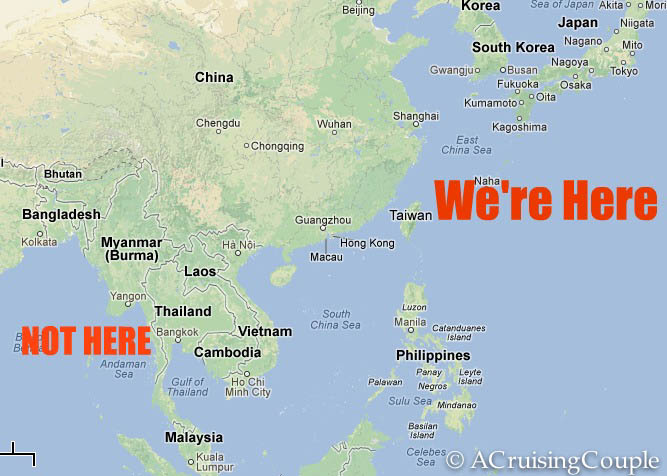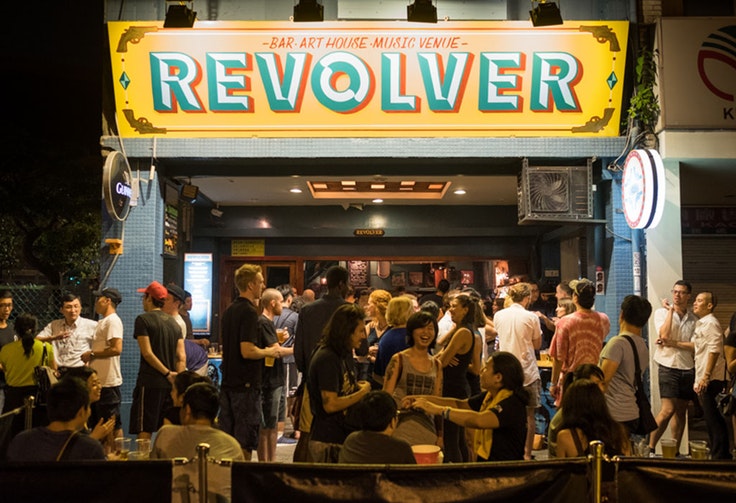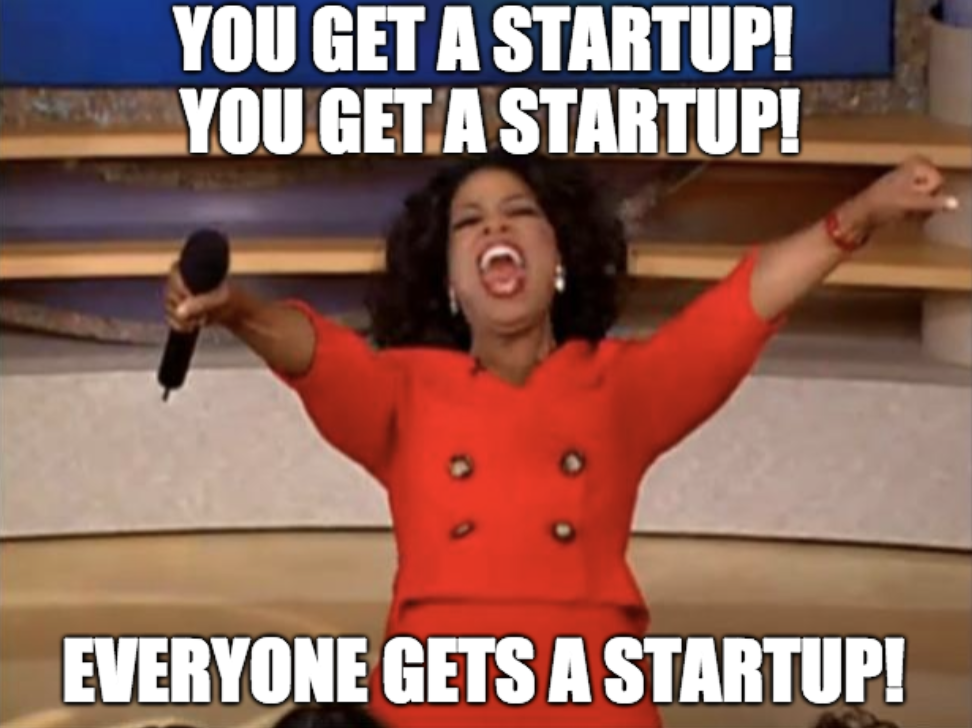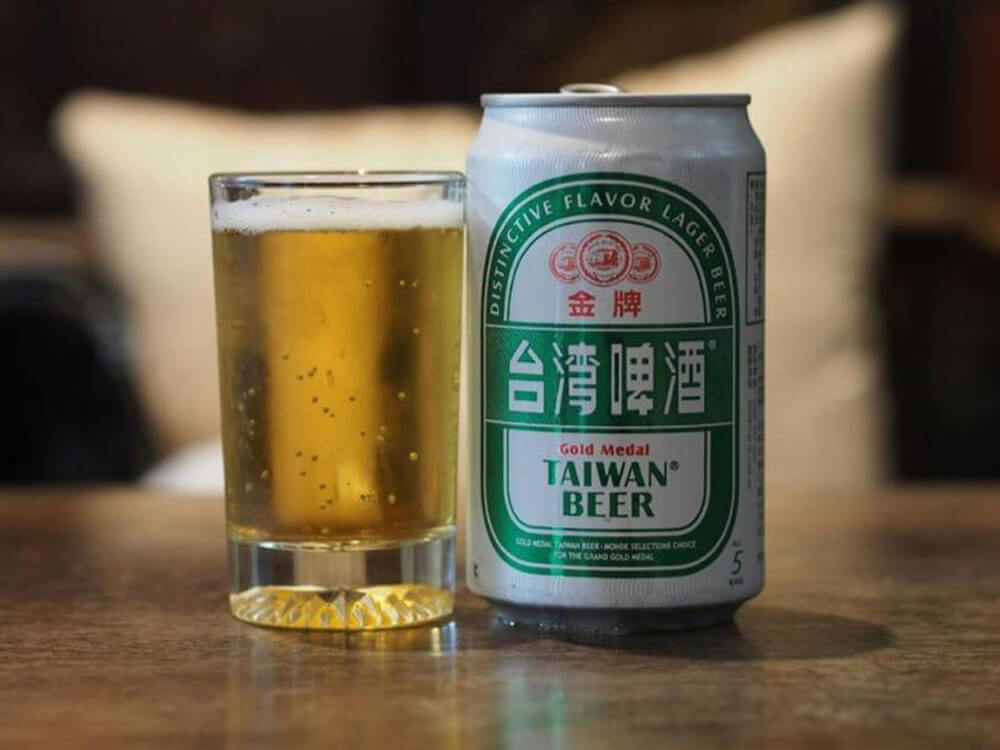Why Taipei? Well, Why the Hell Not?
Taipei is a hidden gem when it comes to startup development. It's a pretty bold statement to make, especially when there are still people who don't know the difference between Taiwan and Thailand. Just in case you're one of them (no judgment), here's a handy little visual to show you the difference.
"You're kidding, right? That island is tiny compared to Thailand," you say with incredulity. "How could such a nondescript little place that most people don't even know about be a good place to build a startup?"
I can see why some of you might be extremely skeptical at this point, but please bear with me! As a responsible netizen, I'll provide some evidence to show why Taipei is an excellent place for your startup to flourish... if it fulfills the following conditions.
Terms and Conditions
Here are the minimal terms and conditions that your startup should fulfill before you consider whether Taipei would be a good place for your startup.
Your primary customer base should not be in Taiwan
Remember before, when we talked about how tiny of an island Taiwan is? As a tiny island nation, our population size is only roughly 23 million people. Disposable income is also very low for an economically developed country (only NTD$532,864 ≃ USD$16,500), meaning that it'll be necessary to significantly lower your prices (and therefore your profit margins) in order to be competitive in such a small market.[1]
Take, for example, Spotify, which engages in differential pricing across its global markets for its premium subscription service. I first purchased a Spotify Premium subscription while I was in college in the States, and was charged USD$9.99 per month. My cousin, who lives here in Taipei, recently also started subscribing to Spotify Premium, but only pays NTD$149.00 per month (≃USD$5.05) for the service.[2] We see a similar situation with Netflix, which is priced at USD$10.99 in the United States and at NTD$270 (≃USD$9.15) in Taiwan for a basic subscription.[3]
As a startup with limited resources and scale, it may be difficult to cater to multiple markets, at least initially. In order to maximize profits, it would probably make more sense for your resources to be concentrated on building up a primary revenue stream from a country with higher disposable income or CPI, like the United States.
Your product should be efficient and cheap to deliver to consumers
Again, pretty logical if you think about where your primary revenue stream is coming from. Convincing a bunch of people in the U.S. to buy your product is all well and good, but if it costs you an astronomical amount of time and money to just deliver the product to them, then you're not really benefiting from the higher price point you're charging, are you?
Consider Trump's emphasis on America First, the ongoing U.S.-China trade war, and present freight industry trends — you're likely to conclude that the best profit-maximizing product is going to be virtual rather than physical. Create a product that can take full advantage of "the world is flat" (no, not you Flat Earthers, I mean Thomas Friedman and globalization), and you'll be able to benefit greatly from price and cost inequalities across markets.[4]
You are open to having a largely Taiwanese team
The flip-side to being in a country with lower disposable income and international fame means that the likelihood of finding available foreigners to join your startup long-term will be considerably lower than in a place like Hong Kong or Singapore. Most of the foreigners you meet in Taipei will be ones that are here for a specific reason, and are therefore unlikely to want long-term full-time employment.
Foreigners are also generally used to having higher incomes, and so will likely be comparatively more expensive to hire than locals. At some point you may even want to consider having a Taiwanese partner as a way of dealing with work permits or capital requirements. There are also a number of differences in work policies and labor regulations that will require a bit of study and research to fully grasp.
You have at least NTD$500,000 available to invest and no explicit affiliation to mainland China
These are the minimal conditions that a foreigner needs to satisfy in order to incorporate a business in Taiwan. There's a minimum NTD$500,000 (≃USD$17,000) capital investment requirement that needs to be transferred in whole to a local bank account tied to the incorporated business. The capital investment must not come, in part or in whole, from mainland China. The foreigner also cannot have an explicit affiliation with mainland China, whether that be through citizenship or something similar.
So does your startup fulfill these four conditions (at least to some degree)? Great! Now we can get to the good part.
The Good Part
So just what kind of benefits can you expect from basing your startup in Taipei, of all places? Well, simply put, in Taipei, you can expect to get more "bang for your buck," or, as Pepsi put it back in the day, "more bounce to the ounce."[5] What you're really getting is insane value on human capital hard to find elsewhere at this point in time.
Quality Employees at Sub-Market Prices! Call 1-800-...
All jokes aside, the price at which you can get quality human capital in Taipei is kind of ridiculous.
Let's look at the average salary of a software developer. According to 104.com, it normally ranges from NTD$40,000 (junior-level) to NTD$60,000 (senior-level) per month.[6] That's an annual salary of between NTD$500,000 to NTD$1,000,000 a year (calculated as 12 months + 1 month bonus), or between USD$15,000 to USD$35,000 a year.
That's insane.
A U.S.-based developer can make three times as much without even breaking a sweat. Or, let's take a look at a non-technical field. Every startup needs an HR manager, and you can get one for between NTD$400,000 to NTD$900,000 (USD$15,000 to USD$30,000) a year depending on seniority.[7]
Granted, these salary ranges I've listed are for pretty average positions at some pretty average companies. A foreign corporation who has chosen to expand to Taipei will generally offer much higher salaries for senior-level positions.
For example, HonestBee, a Singapore-founded food and grocery delivery app, will offer senior developers salaries of up to NTD$2,000,000 a year (≃USD$70,000). Foreigners, or Taiwanese citizens who have had the chance to study abroad, will also generally wish for a slightly higher salary (think maybe around 1.5x the average).
As an intrepid foreign-focused startup, these are probably the individuals that will most pique your interest. You'd probably have at least half of your office made up of these people, and even then, you'd still be paying a lot less than if you were trying to hire equivalent talent in the States.
I'll give you a rough hypothetical. Let's say that I have a SaaS-based startup that needs to hire 10 people in order to run efficiently. I hire an HR manager, three product managers, two back-end and two front-end developers, and two designers. I'll probably also need an accountant and someone for legal advice, but I can outsource that rather than hire full-time. My annual hiring cost in San Francisco would look something like this:[8]
| Position | Annual Cost | Quantity | Total Cost |
|---|---|---|---|
| HR Manager | $100K | 1 | $100K |
| Senior Product Manager | $150K | 1 | $150K |
| Junior Product Manager | $90K | 2 | $180K |
| Senior Back-end Developer | $120K | 1 | $120K |
| Junior Back-end Developer | $80K | 1 | $80K |
| Senior Front-end Developer | $150K | 1 | $150K |
| Junior Front-end Developer | $100K | 1 | $100K |
| UI Designer | $100K | 1 | $100K |
| UX Designer | $100K | 1 | $100K |
| $1.8 million |
I'm spending $1 million an year just to hire 10 employees? That's kind of ridiculous when you think about it. This isn't even including the payouts for C-level positions like the CEO or the CTO. No wonder startups need so many rounds of funding in order to stay alive in their first few years. To expect a fledgling startup to consistently rake in over a million dollars in annual revenue from day one is a very tall order.
Now, at this point, a lot of you are going to say that I'm exaggerating, and that obviously a new start-up isn't going to have a 10 to 15 member team. While I agree with that statement, I'm also using this as a way to point out that you actually can have a startup of this scale... if you were to just relocate your office. Now, let's try moving this startup to Taipei and see how our costs stack up:[9][10]
| Position | Annual Cost (NTD) | Quantity | Total Cost (NTD) |
|---|---|---|---|
| HR Manager | $800K | 1 | $800K |
| Senior Product Manager | $1,000K | 1 | $1 million |
| Junior Product Manager | $600K | 2 | $1,200K |
| Senior Back-end Developer | $1,000K | 1 | $1 million |
| Junior Back-end Developer | $700K | 1 | $700K |
| Senior Front-end Developer | $1,000K | 1 | $1 million |
| Junior Front-end Developer | $700K | 1 | $700K |
| UI Designer | $700K | 1 | $700K |
| UX Designer | $700K | 1 | $700K |
| $7.8 million |
So, around $8 million a year, which is... roughly $300K in USD. Think about that for a second. You've just reduced your hiring costs by a whopping 70%. Sure, your new employees might not have perfect English or an all-American education, but are you really missing out on much?
As of 2017, Taiwan boasts a net enrollment rate of 89.24%, with a tertiary education enrollment rate of 71.13%.[11] As a point of comparison, the US net enrollment rate is 55.2%, with a tertiary education enrollment rate of 69.8%.[12]
Granted, the level of education in the States is undoubtedly higher. Stanford University is ranked third in the world while Taiwan's top university, National Taiwan University, is ranked 198th by the World University Rankings.[13] Why should I settle for hiring someone from NTU when I could base myself in Silicon Valley and get a fresh graduate from Stanford?
But is it really settling? Is someone who graduated from NTU necessarily less skilled than a Stanford grad? I would feel the argument that "alma mater isn't everything" shouldn't be one I'd still have to make, especially to entrepreneurs like yourself. If anything, an NTU grad might even provide more potential per dollar than a Stanford grad, seeing as how you can "purchase" one for only 1/3 the price.
Okay, but that still doesn't solve the underlying communication problem, does it? Even if this hypothetical NTU grad is equal to a Stanford grad in every respect, none of it matters if you have trouble communicating with them in the first place.
Taiwan has traditionally ranked pretty low on the global English literacy scale, even though basic English is taught as a second language in schools. Even skilled English speakers often possess a noticeable accent, which they can't seem to get rid of no matter how much accent training they go through.
While this is undoubtedly a problem, the amount of effort and resources spent on English training in Taiwan is also quite astonishing. Of the younger generations, the vast majority are constantly seeking to improve their English skills because they know it will give them a significant advantage over their colleagues.
The results speak for themselves. Though the accent often remains, the ability of younger generations to communicate and express their thoughts in English have vastly improved. A fun little experiment by the YouTuber IrisVirus helps put this growth into perspective:
So while the average graduate may not be your optimal choice for an English content editor or an English sales representative, they're a great fit for roles in software development, product design, or operations management, among others.
These positions have their own unique "languages" that can bypass the English language barrier, expressed as they are in design elements, economic models, and technical jargon. A Taiwanese programmer may have difficulty expressing a question in plain English, but he'll have no trouble framing the same question with an SQL query.
Similarly, a Taiwanese designer may encounter some grammar issues when building a website, but that doesn't affect either the underlying wireframe or the graphics that have been created.
So why not give us intrepid, well-educated, fresh-faced Taiwanese graduates a try? We're cheap, reliable, intelligent, and some of the hardest workers you'll find. Plus, like I said, it's not as if we want you to hire us for all of the positions at your company. We'd be more than happy to concede English-reliant roles to the true professionals. Speaking of...
That awkward moment when you match with someone you know on Tinder
We've all been there, and it'll probably happen all the time when you start swiping once you've settled in. The number of foreigners from more economically developed countries in Taiwan is very small compared to Hong Kong or Shanghai, largely the result of mainland China's overwhelming presence and Taiwan's ongoing identity crisis with Thailand. While the trend is undoubtedly on the up and up — foreign skilled labor has grown by 15 percent since 2011 — it doesn't even come close to the droves of expats you'll likely see walking around in other major Asian cities.[14]
On the other hand, the considerably smaller community is a lot more tight-knit than in some of those other places. Many foreigners started out as exchange students learning Mandarin, and so know each other well from their school days. They also tend to congregate at the same bars and hangout spots, such as Revolver or On Tap.
This makes it extremely easy for a new foreigner to enter the community and for news regarding hot new positions at interesting startups to travel around. In addition, we Taiwanese love mingling with foreigners, and are unbelievably friendly to people from out of the country. For every new foreign friend you make, you're likely to make five new Taiwanese ones, allowing both your personal and professional communities to grow exponentially.
But let's get back to the issue of actually hiring foreigners for your exciting new startup. While ex-exchange students are undoubtedly an option, the high turnover rate issue remains. These are the people who largely have nothing tying them to Taipei and so can leave at a moment's notice. But what if I told you that there exists an untapped pool of talent with the same skills and experience, minus the turnover rate?
And the answer is... 42 (just kidding, it's Third Culture Kids)
Not quite the answer to Life, the Universe, and Everything (hope you all got that reference), just a good amount of untapped potential to take advantage of. These are people who have spent a large portion of their formative years abroad, and for various reasons, have returned to their country of citizenship for an extended period of time.
For Taiwanese Third Culture Kids (TTCK's), the most common reasons for returning from abroad are conscription and visa issues. The former is the result of Taiwan's national conscription program — all males over the age of 18 and not engaged in formal schooling are expected to fulfill between four months to a year of military conscription.
Any male who skips on the requirement is unable to enter the country without being arrested until the age of 36. The latter is the more common work visa problem that all migrant workers should be familiar with, especially with regards to the United States (obtaining an H-1B Visa even after securing sponsorship literally requires you to enter a lottery), which has only been exacerbated under the Trump administration.
This means that TTCK's only possessing Taiwanese citizenship and no permanent residency elsewhere are in a bit of a pickle once they've graduated... and they're prime for the taking. While many of them are undoubtedly planning on going abroad again in the future, at least in the first few years following the end of military service, there's a high probability that they would be willing to stay in the country should the right opportunities present themselves.
Consider what it is you're offering: decent pay (by Taiwan standards), a decidedly less rigid work culture, access to international clients and colleagues, the ability to make a real and visible impact that's hard to achieve at larger companies, and maybe even a beautiful recommendation letter from the CEO/Founder upon exit.
All of this, at a fraction of the cost in living expenses, makes it a pretty damn good investment for TTCK's. For you, it's a wealth of talent with the same qualifications and language skills as those you'd find in the States, at a much lower price point.
Congratulations! You now have your employee worries all sorted out. But what about setting up the company itself?
You get a startup! You get a startup! Everyone gets a startup!
Sorry, that's a bit misleading. Obviously, you won't just walk through immigration and see the Taiwanese equivalent of Oprah standing there ready to hand you the keys to your new company.
But it's also not an exceedingly complex process either, and there are plenty of resources available at your disposal, including agencies (such as Winkler Partners) that specialize in helping foreign investors incorporate companies in Taiwan. Depending on the specific parameters of your company the process may be slightly more complex, but as a baseline, expect to have at least NTD$500,000 available to invest in your business.[15]
The traditional method of incorporation comes with a couple of other requirements, most important of which is an annual revenue requirement of NTD$3,000,000 (≃USD$100,000).
There are, however, two ways of getting around this requirement, the first of which is to incorporate as a branch office or a representative office instead of as the head company. Incorporating as a branch office in name makes a lot of sense, especially if your major source of revenue resides overseas.
The other option is to apply for a Taiwan Entrepreneurs Visa, which provides numerous benefits while lifting a lot of these pesky requirements. This option has become increasingly popular with foreigners in the startup space due to the broad eligibility requirements covered by the visa as well as its ability to sponsor up to three team members at once.[16]
Check out the official document on eligibility requirements published by the Investment Commission of the Ministry of Economic Affairs here.
If you're not quite at the stage where you're ready to debut your startup, no need to worry either. The number of startup incubators, accelerators, and VC funds in Taiwan are on the rise, and they're especially keen on helping bring foreigners into the country using the Taiwan Entrepreneurs Visa.
Check out Taiwan Startup Stadium and their Starting Lineup program, or the government-managed website, International Entrepreneur Initiative Taiwan to find out more.
The Bottom Line (TL;DR)
Whew, I'm impressed you stuck with this article all the way to the end! But for those of you who sort of just skimmed through everything, don't worry, I've got you covered.
The bottom line is that Taipei is a great place for you to begin your startup because it allows you access to high-quality human capital at much lower price points.
Especially for those startups with global market reach, such as SaaS, IoT, or AI-based startups, basing your operations in Taipei greatly increases your profit margins by allowing you to lower operating costs without sacrificing on quality.
This "cheap" high-quality human capital comes about as the result of a high national tertiary education graduation rate. Not only is education comparatively cheap to obtain, the average wage rate has remained largely stagnant for the past decade.
In addition, a small but tight-knit community of foreigners and an untapped pool of single-citizenship Taiwanese Third Culture Kids help bring together a variety of talent that can be obtained at a much lower price point than elsewhere in the world.
Actually starting a startup is also becoming increasingly convenient. Having recognized the importance of the startup sector to Taiwan's economy, the government has begun a number of initiatives to ease the eligibility requirements and the bureaucratic process for foreign investors and entrepreneurs, first and foremost of which is the issuance of the Taiwan Entrepreneurs Visa.
In addition, the number of incubators, accelerators, and VC funds continue to grow, many of which are working in partnership with the government and helping to shape future policy changes in the Taiwan startup sector.
So what are you waiting for? Taipei is waiting, and ready for the taking.
Please note that the views, thoughts, and opinions expressed in this article are purely personal and do not represent the views of any company or organization I may be affiliated with.
http://win.dgbas.gov.tw/fies/a13.asp?year=105 ↩︎
https://www.spotify.com/tw/premium/ (as of Apr. 23, 2018) ↩︎
https://www.netflix.com/tw-en/ (as of Apr. 23, 2018) ↩︎
http://www.thomaslfriedman.com/the-world-is-flat-3-0/ ↩︎
https://www.phrases.org.uk/meanings/more-bang-for-your-buck.html ↩︎
https://www.104.com.tw/jb/jobwiki/jobCatMaster/stage/2007001004/6 ↩︎
https://www.104.com.tw/jb/wage/list?type=1&jobcat=2001002000&cat=jobmanage ↩︎
https://www.glassdoor.com/Salaries/index.htm (averages are as of Apr. 23, 2018) ↩︎
https://uiuxcafe.com/jobs (as of Apr. 24, 2018) ↩︎
https://www.104.com.tw/jb/wage/ (as of Apr. 24, 2018) ↩︎
http://depart.moe.edu.tw/ED4500/News_Content.aspx?n=48EBDB3B9D51F2B8&sms=F78B10654B1FDBB5&s=40045DB8A5562915 ↩︎
https://nces.ed.gov/programs/digest/current_tables.asp ↩︎
https://www.timeshighereducation.com/world-university-rankings/2018/world-ranking#!/page/0/length/25/sort_by/rank/sort_order/asc/cols/stats ↩︎
https://money.udn.com/money/story/8888/2612423 ↩︎
http://www.111111.com.tw/exco.htm ↩︎
https://startup.sme.gov.tw/taiwan-entrepreneur-visa/ ↩︎







